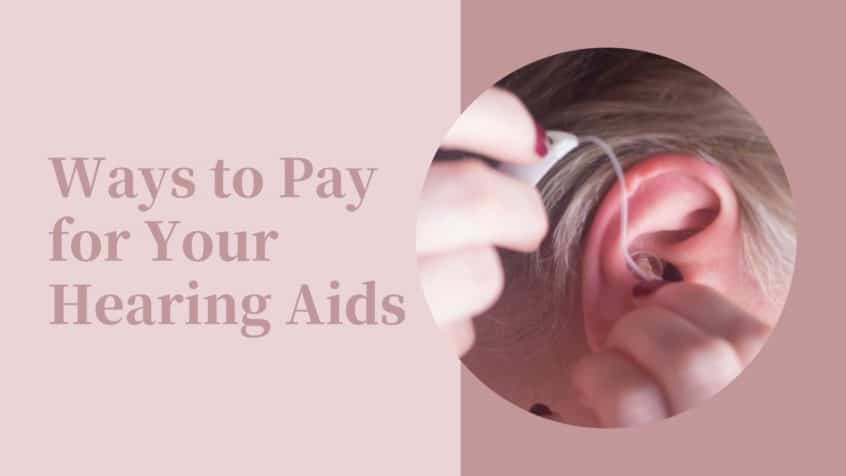Ways to Pay for Your Hearing Aids

If you’re having issues with hearing, hearing aids are the best way to keep your hearing health in good shape. Hearing aids let us begin to hear the world again in ways we may have forgotten, not to mention the importance they have in keeping us active and independent as we go about our lives. Hearing aids are even shown to improve brain health as we age.
About 95% of people who get hearing aids say they’re happy with them, when asked after one year. We hear reports all the time about how hearing aids have helped our patients to maintain friendships, improve partnerships, get outside more often and generally feel better than they did when they were struggling with hearing issues.
Still, hearing aids are a significant expense, and it is frequently the case that someone who needs hearing aids may not be in a financial position to simply pay cash for them. The benefits of hearing aids are vast and significant; it is best to start wearing them as soon as a need is indicated, rather than trying to save up over time to pay for them outright.
At Mt. Hood Hearing, we have been checking our patients’ benefits through their Medicare Advantage plan and have found that most people have some type of assistance available. There are additional third-party insurance plans available, and it seems that it is possible for most people to acquire hearing aids without resorting to credit card purchases.
Varied by State
Some states require health care plans to cover hearing aids. In Oregon, insurers are required to cover one hearing aid per hearing-impaired ear for children or students over 18 who are included in the plan as dependents. While this is a step in the right direction, it doesn’t cover any of those over 18 who do not have dependent status and/or are not enrolled in school.
But just because it is not the law that insurance providers cover hearing aids does not mean that your plan will not include hearing aid coverage. Always check with your provider about your specific plan to see what if any coverage you may have.
Health Insurance Plans
Hearing aids themselves are usually not covered under most health insurance plans. Comprehensive “hearing/vision/dental” plans will usually cover hearing tests and hearing aid fittings, but the instruments themselves are not normally covered.
To find out for sure whether your insurance will pay for hearing aids, check your individual plan. Most insurance cards will have the company’s toll-free number on them, which you can call to inquire about your hearing coverage. Since plans vary widely in what they cover, be sure to ask questions about all the aspects of hearing coverage you can think of. It may be that they pay for hearing tests with a co-pay, or that they cover the cost of hearing aids up to a certain amount.
- Insurance plans may pay in toward the cost of hearing aids up to a certain amount, like $500 or $1,000. The amount may contribute to the total cost of hearing aids, or contribute to each hearing aid. The benefit may renew after 3–5 years (a frequent timeline on which hearing aids might be replaced).
- In some cases, a provider may only pay toward one hearing aid, though the vast majority of patients require two hearing aids to see real benefits.
- Your insurance company may have a list of contracted hearing healthcare providers for whom they pay an allowance. Similar to a pay-in, the allowance will be a contribution toward the cost of your hearing aids that will be reflected as a subtraction from the purchase price. For example, if your allowance is $1,500 and your hearing aids cost $4,000, your out-of-pocket expense will be $2,500. An allowance will also usually renew every few years.
- Rather than an allowance, your insurance company may have a negotiated discount with contracted hearing healthcare providers, reflected as a percentage off the purchase price. The discount may vary between plans and even models of hearing aids.
Department of Veterans’ Affairs (VA)
The VA buys more hearing aids than any other entity in the U.S. If you are a veteran or a dependent of a veteran, check with the VA to see whether you qualify for hearing aids or hearing services through them.
Medicare and Medicaid
While Medicare does not usually cover hearing aids, Medicare Advantage plans do usually have benefits available to you. We can help you find out whether and how much you may be able to receive toward your hearing aids through your Medicare Advantage plan.
Medicaid benefits vary from state to state. In Oregon, Medicaid will cover hearing aids only in cases of moderate to profound hearing loss, but will cover yearly hearing tests and even hearing aid batteries and hearing aid repairs.
Other Options
If you need additional assistance paying for hearing aids, some organizations may be able to help if you meet certain financial criteria. State-run vocational programs may be an option if you require hearing aids to stay in the workforce. The Audient program helps to provide partial-cost hearing aids to low-income individuals nationally. Easter Seals helps low-income children and adults with hearing healthcare services.
If you don’t meet the financial requirements for assistance, medical credit options such as CareCredit may work well for you. CareCredit is similar to a credit card, but offers short-term zero-interest plans and longer-term plans with fixed low interest rates. Leasing hearing aids is also an option, with monthly payments as low as $99.
If you’re having trouble hearing and you’re worried about how to pay for hearing aids, you’re not alone! Call us today to talk about your options and see what we can do to make sure you get the hearing healthcare you need.
